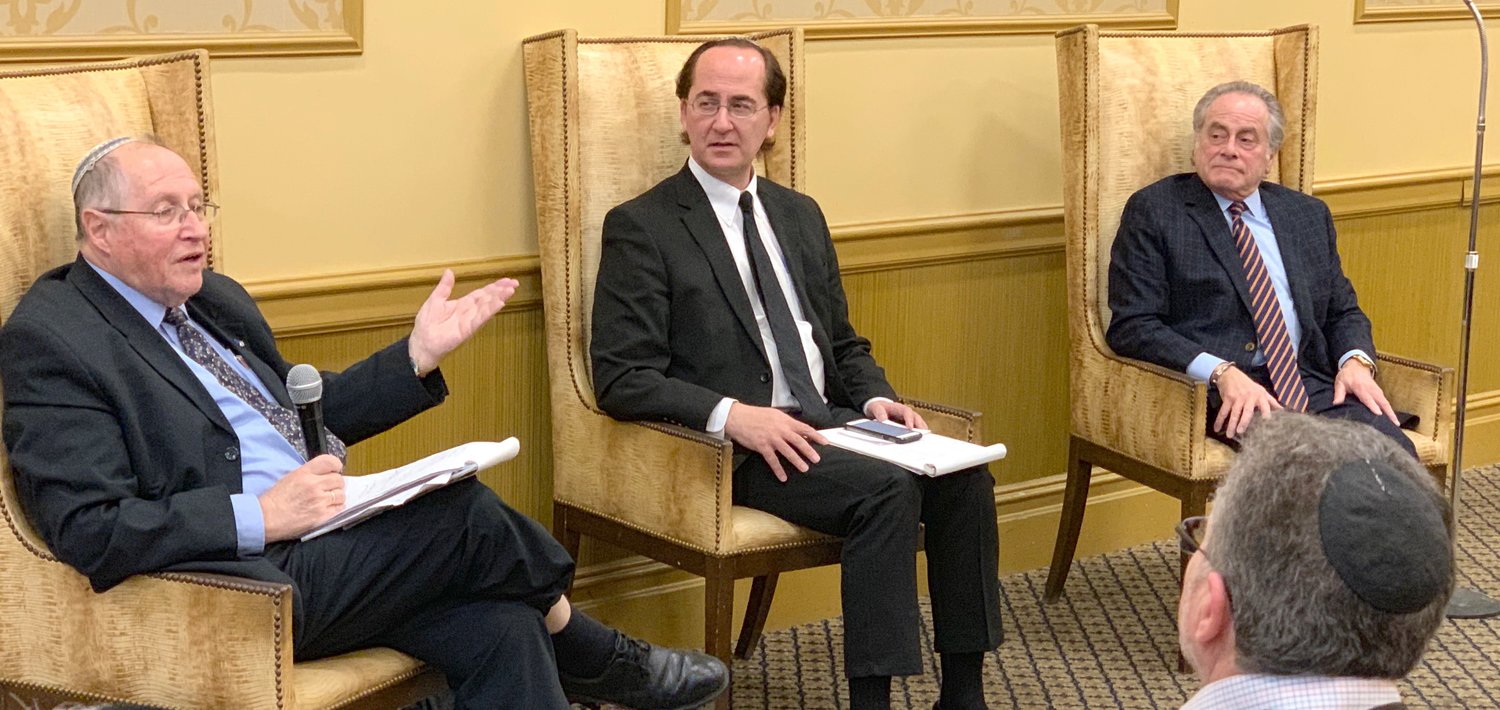Worried about anti-Semites in Congress? Brafman’s solution: Teach our children
That the scourge of anti-Semitism remains uncured does not surprise Elyakim Rubinstein, former vice president of Israel’s Supreme Court, who said that many years ago “there was a notion that after the Holocaust, this was done.” Regrettably, that’s not how things played out.
“We live in dangerous times,” opined prominent criminal defense attorney Benjamun Brafman of Lawrence.
Brafman and Rubinstein engaged in an expansive discussion of “Criminal Justice and Civil Liberties in Israel and America,” hosted by the Touro College Jacob D. Fuchsberg Law Center on Sunday morning at Congregation Beth Shalom in Lawrence.
The recent repeated expressions of anti-Semitism by Minnesota freshman Rep. Ilhan Omar — and the refusal of Democratic Party leaders in the House of Representatives to censure her — worries Brafman.
“When I was a kid growing up as a Jew in Brooklyn, the idea that a Jew would vote for a Republican was unheard of and impossible to even contemplate,” he said. “Today, I think the majority of Jews who are really caring about the state of Israel are supporting Republican candidates.”
“This was a uniquely Jewish anti-Semitic issue that they didn’t have the guts to keep as a Jewish anti-Semitic issue,” he continued. “You’re talking about the men and women who make up the backbone of the normal Democratic congressional support for the state of Israel. So ach un vey if this is who we are going to rely on to have Israel’s back. It’s not enough to have a president who is on Israel’s side.”
The fix may be close to home.
“We need to go back, as they say, to Bereishis, and look at our yeshivot — which either on the rightwing don’t recognize [Medinat] Yisroel or on the very left recognize it but are afraid to be too pro-Israel,” he said. “By the time these kids get to college they’re completely mixed up about what their obligation is” and are unable or unwilling to effectively argue Israel’s case.
Brafman addressed those with children in college. “If you decide they’re smart, they’ll get it — eventually they won’t,” he said. “They are reading too much bad stuff that is just dishonest. … It starts in the yeshivot. By the time you get to college it’s too late.”
He recounted addressing about 700 Jewish students at Harvard about the case for Israel. “I had an intellectually dishonest audience — 65 or 70 percent had no idea what they were talking about,” he said. “They were brainwashed by the time they got to the law school. And these are among our brightest, most sophisticated Jewish students, the future leaders of the Jewish community, G-d help us, and many of them will be in the Congress or the Senate if Harvard statistics are borne out.”
We need to start close to home, because further afield there’s not much warmth.
“Most of the public doesn’t really care and sees Israel as the root of many of the problems that they are dealing with — long lines at the airport, terrorist threats, blame it on Israel,” he said. “If Israel cured cancer tomorrow there are people who would find something wrong with the cure because it came from Israel.”
“So I’m worried, and you should be worried,” Brafman concluded. “The only thing that gives me optimism is the existence of the state of Israel. I think you will see more Americans making aliyah not just because of idealism but because of their realization that times are difficult for Jews in the United States.”
Sunday’s event was moderated by Harry Ballan, dean and professor of Law at the Touro Law Center in Central Islip.
Ballan and Rubinstein discussed some of the differences in how the supreme courts of the U.S. and Israel operate. In many areas, Israel’s high court is one of original jurisdiction — and as a result it must deal with as many as 11,000 cases a year versus around 60 for the U.S. court, Rubinstein said.
In Israel, someone can bring a case before the court on a basis of justice, even if they are not the injured party, while in the U.S. one would need to establish standing, Ballan said.
As for jury trials: The U.S. has them, Israel does not. This is a relic, for better or worse, of the British Mandate, explained Rubinstein, who said “we don’t have a jury because the British decided the Jews and Arabs do not have the mental ability to sit on a jury, and they established the professional judge system.”
“The best jurors are ordinary people who understand the difference between right and wrong,” Brafman said.

 48.0°,
Overcast
48.0°,
Overcast 




